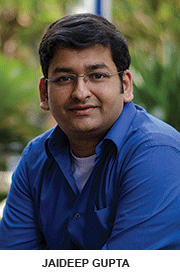 JAIDEEP GUPTA IS founder-chief executive of the Hyderabad-based Univariety, a college admissions planning service
JAIDEEP GUPTA IS founder-chief executive of the Hyderabad-based Univariety, a college admissions planning service
Although career guidance and counseling services have been integral to school education in the West for a long time, only a handful of schools in India realise the need for these services at the most critical juncture of students’ lives.
The reasons are simple. Until very recently Indian parents and students were unable to think of post-school programmes apart from engineering and medicine, and when sending their children for study abroad, their options were limited to the US, UK and Australia. However, with a high number of students averaging 90 percent plus in their class XII exams and stiff competition for admissions into engineering, medical and professional colleges, entrenched attitudes are changing. Contemporary parents and students are beginning to look positively at new and unconventional career options such as games design, visual communication, biotechnology, biomedicine and actuarial science. Moreover, when applying to universities abroad, they are now open to diverse study destinations such as Singapore, Hong Kong, Germany, and the UAE.
In a study conducted by Univariety covering over 5,000 high school students and their parents across ten Indian cities to ascertain their perceptions and concerns about career planning services, only 8 percent attributed their choice of higher study institution to guidance or counseling received in school. Eighty percent of students said they rely on parents and relatives for higher study and career-related advice, and 86 percent of all students expressed anxiety about post-school study options. Moreover, a staggering 91 percent wanted their school to provide higher education and career guidance services.
Hitherto, schools competed to attract students on the basis of board exam results, and for the infrastructure facilities they offered. Now, parents and students expect additional services. Therefore a growing number of secondary and higher secondary schools advertise ‘placement cells’ (aka counseling services). With collegiate and higher education having become very expensive, students are weighing their higher education options very carefully.
This explains why in 2013, career counseling was made mandatory in 39 countries around the world although the depth and detail of information provided varies in each country. In the US, 32 of the republic’s 50 states have made provision of career counseling mandatory.
In 2011-12, only 15-20 of India’s high-end international schools affiliated with the Geneva-based International Baccalaureate Organisation (IBO) and the UK-based Cambridge International Examination (CIE) offered counseling services to students, with an additional 60-80 schools in the metros providing basic further studies advice. But a year later, over 70 international schools have begun offering university placement services. This growth of counseling services is not limited to international schools. Currently more than 350 schools furnish further study advice to students in metros and some tier II cities as well. My estimate is that more than 800 schools countrywide will be providing career counseling services in 2015-16 — most of them top-ranked CBSE/CISCE schools.
ALTHOUGH EX FACIE INTRODUCING career counseling services in schools seems a simple proposition, it requires expertise and considerable investment in organisational resources including people and funding. The expense involved in hiring counselors with knowledge of several countries and career options, training them and devising processes to track, guide and measure students’ progress is by no means small. That’s why a rising number of schools look to support from external experts who can set up career guidance cells quickly and professionally, while simultaneously training in-school teachers to transform into counselors.
Training in-school teachers to double as career counselors makes sense, because external counselors can’t possibly know students as well and interact with them with equal confidence. Hence, school managements need the help of external organisations which train and support teachers to transform into counselors providing swift, empathetic, and technology and data-driven study guidance and career counseling services to their students.
In this connection, a word of caution. School managements as well as parents and students need to note there’s a large and growing number of firms operating under the guise of career counselors but are actually commissioned agents, who promote colleges and universities which pay them high commissions.
(Jaideep Gupta is founder-chief executive of the Hyderabad-based Univariety, a college admissions planning service)